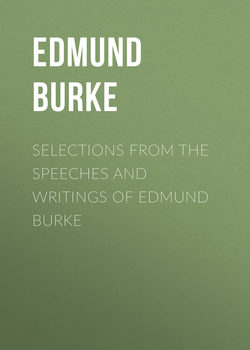Читать книгу Selections from the Speeches and Writings of Edmund Burke - Edmund Burke - Страница 2
APPENDIX
ОглавлениеThe following are the critical sketches of Burke's character, alluded to in the commencement of this Essay. They are from the pens of his most distinguished contemporaries, WHO WERE OPPOSED TO HIM in their political views and public career.
(From SIR JAMES MACKINTOSH.)
"There can be no hesitation in according to him a station among the most extraordinary men that ever appeared; and we think there is now but little diversity of opinion as to the kind of place which it is fit to assign him. He was a writer of the first class, and excelled in almost every kind of composition. Possessed of most extensive knowledge, and of the most various description; acquainted alike with what different classes of men knew, each in his own province, and with much that hardly any one ever thought of learning; he could either bring his masses of information to bear directly upon the subjects to which they severally belonged,—or he could avail himself of them generally to strengthen his faculties, and enlarge his views,—or he could turn any of them to account for the purpose of illustrating his theme, or enriching his diction. Hence, when he is handling any one matter, we perceive that we are conversing with a reasoner or a teacher, to whom almost every other branch of knowledge is familiar: his views range over all the cognate objects; his reasonings are derived from principles applicable to other themes, as well as the one in hand; arguments pour in from all sides, as well as those which start up under our feet,—the natural growth of the path he is leading us over; while to throw light round our steps, and either explore its darkest places, or serve for our recreation; illustrations are fetched from a thousand quarters, and an imagination marvellously quick to descry unthought of resemblances, points to our use the stores, which a love yet more marvellously has gathered from all ages and nations, and arts and tongues. We are, in respect of the argument, reminded of Bacon's multifarious knowledge, and the exuberance of his learned fancy; whilst the many-lettered diction recalls to mind the first of English poets, and his immortal verse, rich with the spoils of all sciences and all times.
…
"He produced but one philosophical treatise; but no man lays down abstract principles more soundly, or better traces their application. All his works, indeed, even his controversial, are so infused with general reflection, so variegated with speculative discussion, that they wear the air of the Lyceum, as well as the Academy."
(From LORD ERSKINE.)
"I shall take care to put Burke's work on the French Revolution into the hands of those whose principles are left to my protection. I shall take care that they have the advantage of doing, in the regular progression of youthful studies, what I have done even in the short intervals of laborious life; that they shall transcribe with their own hands from all the works of this most extraordinary person, and from this last, among the rest, the soundest truths of religion, the justest principles of morals, inculcated and rendered delightful by the most sublime eloquence; the highest reach of philosophy brought down to the level of common minds by the most captivating taste; the most enlightened observations on history, and the most copious collection of useful maxims for the experience of common life."
(From KING, Bishop of Rochester.) "In the mind of Mr. Burke political principles were not objects of barren speculation. Wisdom in him was always practical. Whatever his understanding adopted as truth, made its way to his heart, and sank deep into it; and his ardent and generous feelings seized with promptitude every occasion of applying it to mankind. Where shall we find recorded exertions of active benevolence at once so numerous, so varied, and so important, made by one man? Among those, the redress of wrongs, and the protection of weakness from the oppression of power, were most conspicuous.
…
The assumption of arbitrary power, in whatever shape it appeared, whether under the veil of legitimacy, or skulking in the disguise of State necessity, or presenting the shameless front of usurpation—whether the prescriptive claim of ascendancy, or the career of official authority, or the newly-acquired dominion of a mob,—was the pure object of his detestation and hostility; and this is not a fanciful enumeration of possible cases," etc.
